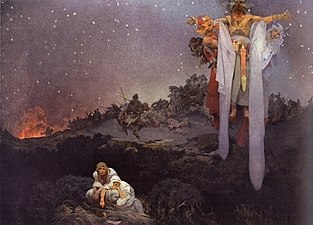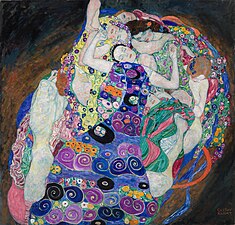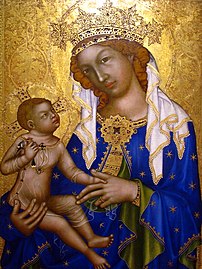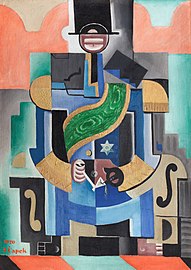National Gallery Prague
Národní galerie Praha | |
 | |
 Veletržní palác (the Trade Fair Palace) houses the National Gallery Prague | |
 Interactive fullscreen map | |
| Established | 1796 |
|---|---|
| Location | Prague |
| Coordinates | 50°6′4″N 14°25′57″E / 50.10111°N 14.43250°E |
| Type | Art museum |
| Visitors | 711,928 (2018)[1] |
| Director | Alicja Knast |
| Curator | Adam Budak |
| Public transit access | Tram stop: Veletržní palác C Vltavská |
| Website | ngprague.cz/en |
The National Gallery Prague (Template:Lang-cz, NGP), formerly the National Gallery in Prague (Národní galerie v Praze), is a state-owned art gallery in Prague, which manages the largest collection of art in the Czech Republic and presents masterpieces of Czech and international fine art in permanent and temporary exhibitions. The collections of the gallery are not housed in a single building, but are presented in a number of historic structures within the city of Prague, as well as other places. The largest of the gallery sites is the Trade Fair Palace (Veletržní Palác), which houses the National Gallery's collection of modern art. Other important exhibition spaces are located in the Convent of St Agnes of Bohemia, the Kinský Palace, the Salm Palace, the Schwarzenberg Palace, the Sternberg Palace, and the Wallenstein Riding School. Founded in 1796, it is one of the world's oldest public art galleries and one of the largest museums in Central Europe.
History

The history of the National Gallery dates back to the end of the 18th century (namely February 5, 1796[2]), when a group of prominent representatives of Bohemian patriotic aristocracy (Kolowrat, Sternberg, Nostitz) and middle-class intellectuals decided to elevate what they called the "debased artistic taste" of the local population. The institution, which received the title Society of Patriotic Friends of the Arts, established the Academy of Fine Arts and the Picture Gallery. In 1918 the Picture Gallery became a central collection of newly formed Czechoslovakia.
In 1995 new spaces dedicated to 19th- and 20th-century art were opened in the refurbished Veletržní Palác (Trade Fair Palace), itself a national monument as Prague's largest functionalist building and one of the earliest examples of that architectural style in the city (construction began in 1925).
St George's Convent (Hradčany) was formerly used to display Art of the Middle Ages in Bohemia and Central Europe, baroque art, and the 19th-century art of Bohemia.
The collections
Old Masters
- Convent of St Agnes of Bohemia (Old Town) – Art of the Middle Ages in Bohemia and Central Europe
- Šternberk Palace (Hradčany) – European Art from Antiquity to the end of the Baroque period
- Schwarzenberg palace (Hradčany) – Baroque in Bohemia
19th-Century Art
- Salm Palace (Hradčany)
Modern and Contemporary Art

- Veletržní palác (Trade Fair Palace), Holešovice – 19th-, 20th-, and 21st-century art, the National Gallery's largest collection. Since 2012 Alfons Mucha's Slav Epic has been on display here.
- The international collection includes numerous works by artists such as Picasso, Monet, Van Gogh, Rodin, Gauguin, Cézanne, Renoir, Schiele, Munch, Miró and Klimt; many of these are donations from the collection of art historian Vincenc Kramář.
- Picasso, who has a spacious room to himself in the gallery, has two self-portraits there, and two of his nudes in addition to more abstract work. Works by Rodin, whose exhibition in Prague in the early 20th century had a profound impact on Czech sculpture for many years afterwards, include a series of busts and full-sized figure on a variety of subjects in the gallery.
- The vast collection contains a large number of Czech and Slovak paintings and sculptures, including works by Alfons Mucha, Otto Gutfreund, František Kupka, T. F. Šimon, Tavik Frantisek Simon (1877-1942), Rudolf Fila, Vincenc Beneš and Bohumil Kubišta. Along with the Black Madonna House and the Museum Kampa, the Trade fair palace collection is one of the most notable collections of Czech Cubism in Prague. Notable works include Don Quixote by Gutfreund, Military Funeral by Beneš, an array of paintings by Kupka, covering almost all of the styles with which he experimented.
- House of the Black Madonna (Old Town) – Czech Cubism
Graphics Collection
- Kinský Palace (Old Town)
Oriental Art
- Kinský Palace (Old Town) – Art of Asia and Art of the Ancient World
On display outside Prague
- Kinský castle Žďár nad Sázavou – Baroque Art from the Collections of the National Gallery in Prague
- Fryštát castle in Karviná – 19th-century Czech art from the Collections of the National Gallery in Prague
Gallery
-
Vyšší Brod Altarpiece, 1345–1350
-
Expulsion from the Garden of Eden, Peter Paul Rubens, 1620
-
Scholar at his Study, Rembrandt van Rijn, 1634
-
Murder in the House, Jakub Schikaneder, 1890
-
Evening Street, Jakub Schikaneder, 1906
-
František Kupka, Fugue in Two Colors, 1912
-
Alphonse Mucha, The Slav Epic, 1912
-
The Maiden, Gustav Klimt, 1913
-
Portrait of a Young Lady from Egypt, 2nd century AD
-
Madonna of Zbraslav, 1340–1350
-
Třeboň Altarpiece, 1380–1390
-
Adam and Eve, Lucas Cranach the Elder, ca. 1538
-
Epitaph of Goldsmith Nicolas Müller of Prague, Bartholomaeus Spranger, 1592–1593
-
Simeon with Infant Jesus, Petr Brandl, 1725
-
Josephine, Josef Mánes, 1855
-
Lovers, Auguste Renoir, 1875
-
Self-portrait, Henri Rousseau, 1890
-
Souvenir of Le Havre, Pablo Picasso, 1912
-
Saint Sebastian, Bohumil Kubišta, 1912
-
African King, Josef Čapek, 1920
See also
References
- ^ "Klesá návštěvnost Národní galerie, nebo ne? Ministr Staněk si protiřečí | Aktuálně.cz". Aktuálně.cz (in Czech). 24 April 2019. Retrieved 7 June 2019.
- ^ "A brief history". Archived from the original on 22 November 2013. Retrieved 28 October 2012.
External links
- Official website
- Collections of NGP
- National Gallery Prague within Google Arts & Culture
 Media related to Národní galerie v Praze at Wikimedia Commons
Media related to Národní galerie v Praze at Wikimedia Commons
























